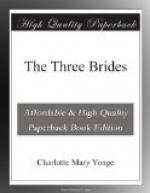“No, certainly not, though Sister Margaret told Rosamond they had never had such a sobering lesson in their lives as their share in the mischief to you.”
“It was not their fault,” said Herbert. “It was deeper down than that. And they were good girls after all, if one only had had sense.”
“Oh!—”
“Nonsense, Jenny,” with a little smile, as he read her face, “I’m not bitten—no—but they, and poor Lady Tyrrell, and all are proof enough that it is easy to turn my head, and that I am one who ought to keep out of that style of thing for the future. So do silence Phil, for you know when he gets a thing into his head how he goes on, and I do not think I can bear it now.”
“I am sure you can’t,” said Jenny, emphatically, “and I’ll do my best. Only, Herbie, dear, do one thing for me, don’t bind yourself by any regular renunciations of moderate things now your mind is excited, and you are weak. I am sure Julius or Dr. Easterby would say so.”
“I’ll think,” said Herbert. “But if I am forgiven for this year, nothing seems to me too much to give up to the Great Shepherd to show my sorrow. ‘Feed My sheep’ was the way He bade St. Peter prove his love.”
Jenny longed to say it was feeding the sheep rather than self-privation, but she was not sure of her ground, and Herbert’s low, quiet, soft voice went to her heart. There were two great tears on his cheeks, he shut his eyes as if to keep back any more, and turned his face inwards on the sofa, his lips still murmuring over ’Feed My sheep.’ She looked at him, feeling as if, while her heart had wakened to new glad hopes of earth, her brother, in her fulfilled prayer, had soared beyond her. They were both quite still till Mrs. Duncombe came to the door.
She was at the Rectory, her house being dismantled, and she, having stayed till the last case of fever was convalescent, and the Sisters recalled, was to go the next day to her mother-in-law’s. She was almost as much altered as Herbert himself. Her jaunty air had given way to something equally energetic, but she looked wiry and worn, and her gold pheasant’s crest had become little more than a sandy wisp, as she came quietly in and took the hand that Herbert held out to her, saying how glad she was to see him on the mend.
He asked after some of the people whom they had attended together, and listened to the details, asking specially after one or two families, where one or both parents had been taken away. “Poor Cecil Poynsett is undertaking them,” was the answer in each case. Some had been already sent to orphanages; others were boarded out till places could be found for them; and the Sisters had taken charge of two.
Then one widow was to ‘do for’ the Vicar, who had taken solitary possession of the Vicarage, but would soon be joined there by one or more curates. He had been inducted into the ruinous chancel of the poor old church, had paid the architect of the Rat-house fifty pounds (a sum just equalling the proceeds of the bazaar) to be rid of his plans; had brought down a first-rate architect; and in the meantime was working the little iron church vigorously.




